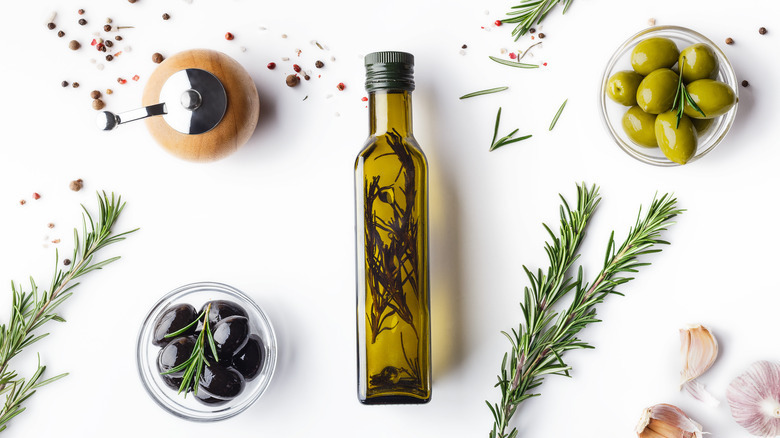Why You Should Never Store Infused Olive Oil In The Pantry
Olive oil is a cooking staple for most home chefs, and when it comes to the best olive oils for cooking, we've all got the standard go-to brand that we rely on. While pure olive oil is often used for pan-frying in a number of recipes — and even in baking as a substitute for melted butter — infused olive oils can give your recipes even more of a kick. Already-made infused olive oils contain flavors like garlic, basil, chili, or even lemon, or you can infuse olive oil at home for a fun, cost-effective experiment.
If you're up to the challenge, you can try this charred tomato oil, which is great drizzled over pizza and salads. However, it's important to keep in mind that while your standard olive oil is shelf-stable, meaning it can be stored in a cool, dark place like your pantry safely, infused olive oil should never be kept on your pantry shelf. Here's why, and where you should store infused oils instead.
Store infused olive oil in the refrigerator
Whether store-bought or homemade infused olive oils should always be stored in the refrigerator, not your pantry, once they're opened. Without refrigerating infused oils, you risk them developing botulism, according to Food & Wine. The risk is particularly high when you infuse the oil with fresh ingredients, such as garlic, that grow underground and could have come in contact with contaminated soils, per Our Everyday Life.
The shelf-life of infused olive oils will depend on what you're adding, but generally speaking, it's much shorter than your standard olive oil. Most pure olive oils are good for anywhere between 12 to 24 months, reports Healthline. On the other hand, infused oils last up to a month on average when they're stored properly in the refrigerator, according to Tantillo Foods. But, as with everything in the fridge, use your best judgment — toss it if your oil takes on a funky smell or starts looking like a fuzzy science experiment.

